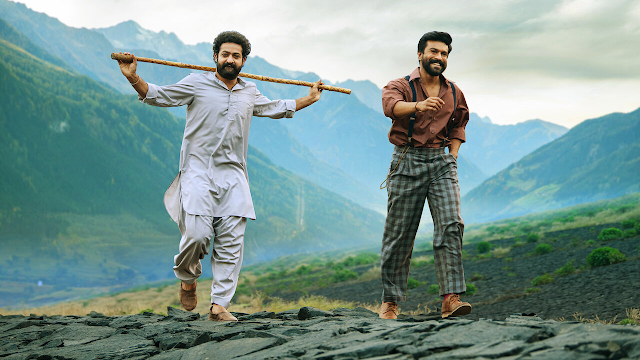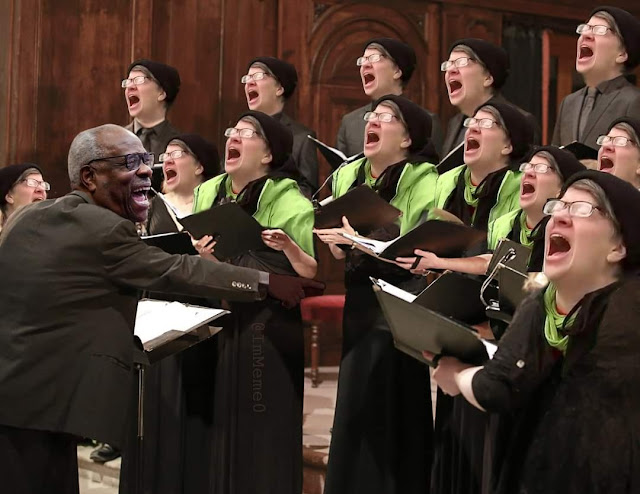I think I just watched my first
bona fide Bollywood film. 2022's "RRR," a testosterone-jacked action flick if ever there was one, has been trending on Netflix, picking up the slack now that "Squid Game" mania has died down. Despite having done some digging, I'm not sure how the title is supposed to be pronounced: "R-R-R"? "Triple R"? Just "rrrrrrr," like a tiger's growl? I have no clue. It doesn't help that the title may stand for different things: the movie's own English title cards suggest,
Rise, Roar, Revolt, but the three Rs could also refer to the director, SS Ramajouli; and the two main stars: NT Rama Rao, Jr. and Ram Charan. In the Telugu language, spoken in the southeast sector of India, the three Rs could mean
Raudram, Ranam, Rudhiram ("rage, war, blood"—distinctly more martial).
If you've ever eaten Indian food, then you may know that Indian food is paradoxically subtle and unsubtle; the masala spice combinations vary from region to region, but unlike the sweet blandness that took over when "curry" went as far east as Japan and Korea, Indian masala, for all its subtle variations, tends to hit you right in the face, with no apologies. "RRR" is a lot like that: it's full of silly, over-the-top action that owes a huge debt to filmmakers like John Woo (with his balletic, there-are-no-coincidences action set pieces) and Zack Snyder (with his sped-up, slowed-down, super-crisp-looking motion), but at the same time, the movie traffics in a kaleidoscope of themes—some unsubtle, but many of them subtle.
While this may be my first-ever Bollywood watch (I don't think "Slumdog Millionaire" and "The Lunchbox" really count: they have no musical numbers), I did already know that Bollywood films are famous for their suddenly erupting song-and-dance routines. I was therefore expecting a spectacle, and I got one. I didn't count, but at a guess, the movie probably has five or so grandiose musical sections. In some cases, the plot itself made an excuse for the singing and dancing; in other cases, the songs and dances felt a bit more shoehorned in. All in all, I didn't resent the presence of the singing and dancing; it was a bit like watching a Disney animated film in the vein of, say, "Tangled."
The movie is apparently based on the lives of two Indian revolutionaries who were born in the same province and worked in parallel to each other, each striving for Indian independence from the British Raj (which is depicted as fairly cruel and sadistic in this film; I don't know that history very well, so I can't say how horrible the Raj was, although it seems to have left a bad taste in Indian mouths if they're crafting movies about it roughly a century later*). In real life, these two revolutionaries never met, but director Ramajouli said he wanted to craft a "what if" tale in which these two larger-than-life men met and became fast friends.
It should be no surprise, then, that among the major themes of the movie are friendship and brotherhood—two things that are tested over and over. Komaram Bheem (Rao) is a tribal guardian. When a little girl named Malli (Twinkle Sharma—you read that right) is forcibly taken from his tribe by the British, Bheem vows to go to the big city, Delhi, and rescue the girl. The British get wind of this "hunter," and they send their best man, A. Rama Raju (Charan) to find and apprehend Bheem. Despite being determined to hunt Bheem down, officer Raju is not without a heart: when a little boy in a river is put in danger by a train that explodes on a bridge above him, Raju pauses his search to help the boy... and he does so with the help of Bheem, who also happens to be on site when the train accident happens. The two men bond instantly, silently working out a plan to rescue the kid, and that's how we get one of the film's biggest action sequences (in a film filled with big action sequences). Raju, of course, doesn't realize that the man he's hunting is standing right in front of him, and Bheem doesn't reveal the real reason why he has come to Delhi—to rescue the little tribal girl Malli.
This sets the stage for several reveals that I don't want to spoil here, but as you can already see from the little I've laid out, the potential for a sundered friendship is there. (In fact, I may have already spoiled things by noting that the two main characters were both real-life revolutionaries.) "RRR" isn't as labyrinthine as some Chinese movies are, with their plots-within-plots-within-plots, but you do need to pay attention to follow the characters' actions and motives. There was, for example, a sudden jump cut in which Raju is, one moment, sporting a smart-looking mustache, and then in the next moment, he's also got a beard. This took me a second to figure out; I was wondering, at first, whether the story had shifted to a different point-of-view character. But, no—we were still following Raju.
Let's first talk about where the movie fell down. The dialogue is horribly dubbed, which again put me in mind of badly dubbed Chinese movies and their corny-sounding English. The English used by the English actors sounds more or less natural, albeit somewhat bland and occasionally stilted. The filmmakers make most of the British out to be nasty and bloodthirsty—including Catherine (a nearly unrecognizable Allison Doody, whom I last saw as Elsa in "Indiana Jones and the Last Crusade"), the wife of the main bad guy, regional governor Scott Buxton (Ray Stevenson). The only good Brit we meet is Jennifer (Olivia Morris), who is ashamed of the way the British authorities treat the locals; Bheem develops a soft spot for her. The British soldiers are also portrayed as this film's version of Star Wars stormtroopers, i.e., incompetent cannon fodder. Coincidences and other implausibilities create a ton of plot holes, one of the biggest being that Raju, even with a police sketch in hand, long fails to recognize that his friend Bheem is his quarry. The movie does little with its female characters, who are there mainly to look pretty, die nobly, and provide emotional support for our heroes. Little Malli, in particular, comes off as a bit spoiled and whiny. Some of the special effects, especially involving animals, also tended to look a tad cheap, but I did read that the movie had only a $72 million budget, so I guess the effects team did the best with what it had. There were occasionally times when the movie's musical soundtrack was a bit distracting, but I imagine that non-Americans who watch American action movies probably roll their eyes when patriotic music wells up in an overt attempt at emotional manipulation. It's always easier to spot the manipulation when you're watching a foreign movie, but it's definitely there in our own culture's films. Some of the acting also tended toward the sort of weepy melodrama I normally see on Korean TV, but this wasn't nearly as bad as Korean fare.
Which brings us to the film's many good points. Despite lasting over three hours (the run time is listed as 182 minutes), "RRR" is never boring. It's actually paced quite well, with flashbacks that explain our main characters' back stories. This is, as I noted at the beginning, a testosterone-jacked actioner; the film worships martial prowess and muscularity, and it feeds us scene after scene of hilariously balletic fight choreography involving human and animal combat. Our heroes both survive wounds that would have stopped a lion, but since I grew up on a diet of "Die Hard"-themed action flicks, I'm used to seeing a hero lose copious amounts of blood and still soldier on. While some might say the film's overtly nationalistic point of view is a disadvantage, I personally have no problem with people of Country X being proud of Country X. Others might complain about the film's utterly implausible action scenes, but the director threw realism out the window when he decided to mess with history and make these two real-life heroes meet, despite no evidence that such a meeting ever happened. I appreciated the movie's emotional beats and got into the film's glorification of what the Greeks would have called aretê, or excellence. Muscular Bheem and tough, agile Raju are both good at what they do, and one of the best things about the film is how it explores their friendship. Both Rao and Charan absolutely sell this with their earnest performances. The movie also contains plenty of religious references, only some of which I caught. With Raju being named after the Hindu god Rama, it's only natural that we see Raju evolve from an officer of the Raj into a long-haired, long-bearded, muscular revolutionary who looks like Rama's avatar. Even Bheem's first name, Komaram, contains the "ram" particle meaning Rama. The use of animals in combat (all the animals were CGI, so no real critters were ever hurt) also has symbolic significance from a Hindu perspective: nature fights with us.
So all in all, this is a silly, brawny, super-bromantic film about two friends. I don't want to spoil everything by offering details on that friendship/brotherhood's twists and turns, but I will say that the larger features of the plot were telegraphed early on, making much of the story predictable. Despite that predictability, though, "RRR" was more entertaining and emotionally satisfying than I thought it would be, and if this truly was my first-ever Bollywood film, then I have to say that I'm pretty impressed by what Bollywood can do on what is, by current Hollywood standards, a shoestring budget.
__________
*The British Raj lasted from 1858 to 1947, so saying "a century" is only approximate. Whether the Raj happened a century ago depends on where you count from. From 1858, that's 164 years. From 1947, though, it's more like 75 years.



























